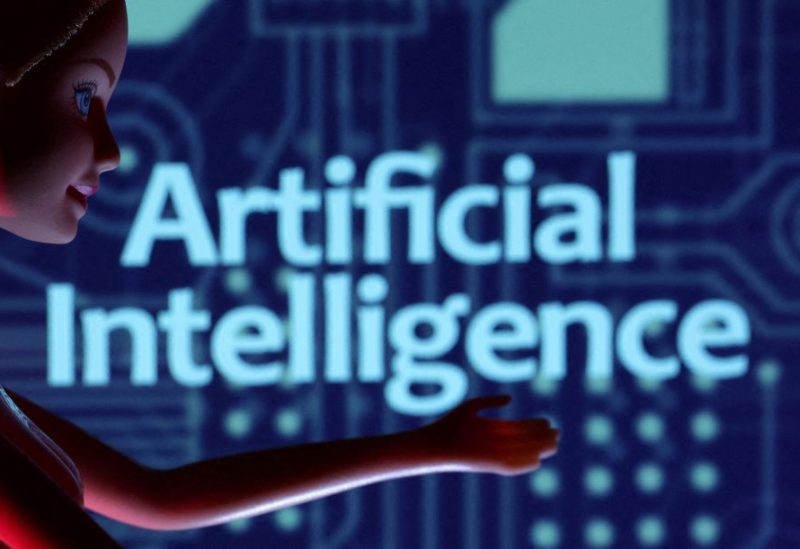
Artificial Intelligence words are seen in this illustration taken March 31, 2023. REUTERS/Dado Ruvic/Illustration/File Photo
“Don’t die from anything stupid”, is what Peter Diamandis, entrepreneur and founder of XPRIZE foundation and Singularity University, often says. He, and many others, see a revolution in human health, enabled by the unprecedented and rapid advancement in Artificial Intelligence, the result of which is a significant prolongation of a lifespan.
As we look forward to the next decade, the fusion of AI with healthcare promises to radically transform medical diagnostics, drug development, personalized medicine, and patient care. This essay explores the realistic potential advancements in healthcare driven by AI, delving into how these innovations could reshape the future of medicine.
AI in Drug Discovery and Development
One of the major potential impacts of AI is in drug discovery and development. AI algorithms are becoming increasingly adept at sifting through vast datasets, and likely be very capable of predicting the relationship between diseases, biological targets, and simulated compounds. This may mean the identification of potential novel drug targets and the methods to synthesize the appropriate drug candidates much faster and differently than traditional methods. If/when successful, AI is expected to significantly reduce the time and cost associated with drug discovery.
The future will also see AI significantly impacting clinical trials, making them more efficient and effective. By using AI algorithms to analyze patient data, researchers can identify suitable candidates for trials more quickly and accurately. This not only speeds up the recruitment process but also ensures that trials are more representative of the population. Operationally, AI can monitor trial data in real-time, allowing for faster identification of potential issues or side effects, thereby increasing the safety and efficacy of new drugs. We already see preliminary efforts (Prediction of Clinical Trials Outcomes Based on Target Choice and Clinical Trial Design with Multi‐Modal Artificial Intelligence – Aliper – 2023) to predict the outcome of trials. This will only get profoundly better and become a complete game changer.
In addition, AI is set to usher in a new era of digital therapeutics. These are evidence-based therapeutic interventions driven by high-quality software programs to prevent, manage, or treat a medical disorder or disease. AI-powered apps and devices that deliver personalized advice and therapy could become even more effective and prevalent. This approach not only supports traditional treatments but also provides new avenues for managing chronic conditions, mental health, and lifestyle diseases.
Personalized Medicine
AI’s ability to analyze large datasets will also revolutionize personalized medicine. By leveraging patient data, including genetic information, non-invasive biomarkers, lifestyle, environmental factors, and radiological scans, AI can help tailor treatments to individual people. This approach not only improves the efficacy of treatments but may also minimize side effects. In the future, AI-driven tools could enable clinicians to select the most effective drugs and treatment protocols based on a patient’s unique biology.
AI is also set to transform diagnostics. Machine learning algorithms are already being used to interpret medical images with a level of precision that matches or surpasses human experts. In the future, these technologies will become more sophisticated, enabling earlier and more accurate diagnosis of conditions such as cancer, heart disease, and neurological disorders. Furthermore, AI-powered diagnostic tools could become accessible remotely, bridging the gap in healthcare accessibility.
Operational Efficiency in Healthcare
AI will undoubtedly enhance operational efficiency within healthcare systems. From optimizing hospital workflow to managing patient data and predicting patient admission rates, AI systems can help healthcare providers deliver better care through superior resource management and planning. Specifically, AI systems can automate administrative tasks like scheduling, billing, and patient record management, reducing the administrative burden on healthcare professionals and allowing them to focus more on patient care. This increased efficiency not only improves patient outcomes but also has the potential to reduce the overall cost of healthcare delivery.
Additionally, the integration of AI in telemedicine and remote patient monitoring will further enhance healthcare delivery. AI-powered telemedicine platforms can offer preliminary diagnoses, recommend treatment options, and even predict the urgency of medical issues. Additionally, wearable devices equipped with AI algorithms can continuously monitor patients’ health status, providing real-time data to healthcare providers. This not only enables early intervention in case of any anomalies but also offers a convenient way for patients to manage their health.
Challenges in Implementation and Integration
Despite the optimism surrounding AI in healthcare, there are significant challenges in implementation and integration. These include the need for high-quality, standardized data, ensuring interoperability between different AI systems and healthcare databases, and the ongoing training of healthcare professionals to work alongside AI technologies. Additionally, addressing regulatory challenges and ensuring compliance with healthcare standards is essential for the safe and effective use of AI in these fields.
Ethical considerations surrounding data privacy and security are paramount. Ensuring that AI systems are transparent, explainable, and unbiased is critical for their acceptance and effectiveness in healthcare settings.
Perhaps the biggest challenge is not letting AI-enabled advancements in healthcare become limited to improving the lives of the rich. The true impact of transformative healthcare tools will be felt when the masses are able to take advantage of them. The technology literacy, affordability, and health access gaps need to be significantly closed, and that requires a collaboration between public sector and private patient advocacies and organizations who can facilitate the penetration of AI-enabled technologies into underserved countries and communities at macro and micro levels.
As we look towards the future, the potential of AI in transforming human life is immense. It promises not only to enhance the efficiency and effectiveness of treatments but also to bring about more personalized and patient-centric care where prevention may play an increasingly significant role. However, realizing this potential will require careful navigation of technical, ethical, and regulatory challenges. The optimist in me believes that AI will have a significant impact on human longevity. So I will take Peter Diamandis’ advice and try not to die of anything stupid.